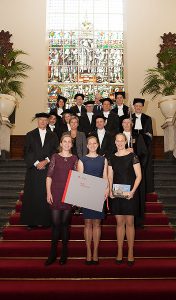Defense Hilda van den Bos
On Monday, the 23rd of October, Hilda van den Bos successfully defended her PhD thesis, entitled “Aneuploidy in the human brain and cancer. Studying heterogeneity using single-cell sequencing.”
Thesis summary:
Aneuploidy, an aberrant number of chromosomes in a cell, is a feature of several syndromes associated with cognitive and developmental defects. In addition, aneuploidy is considered a hallmark of cancer cells and has been suggested to play a role in neurodegenerative disease. To better understand the relationship between aneuploidy and disease, various methods to measure the chromosome numbers in cells have been developed, each with their own advantages and limitations.
The development of single-cell sequencing techniques has opened up a new field of research. By sequencing the genomes of individual cells, information on the genetic diversity in sample can be gathered which would be lost when the DNA of many cells is pooled and sequenced in one reaction. This genetic diversity is often referred to as the heterogeneity of a sample. The more cells differ from each other, in structural features such as inversions, deletions, amplifications and whole chromosomal copy number aberrations (CNAs) as well as in point mutations, the more heterogeneous the sample is.
We developed a pre-amplification free, single-cell library preparation and sequencing protocol. DNA libraries are made from single cells, with each cell receiving a unique barcode, and sequenced. Since there is no pre-amplification step, a particular genomic location is expected to be represented in libraries only twice, one from each homolog of diploid individuals. The distribution of reads across the chromosomes can therefore be used as a faithful indicator of the chromosome copy number. An algorithm called AneuFinder has been developed to determine copy number states of each chromosome or sub-chromosomal region.
In this thesis, we discuss the possible role of aneuploidy in normal brain development and neurodegeneration and set out to provide more insight into the presence or absence of aneuploid cells in the human brain using single cell sequencing. We sequenced brain cells from individuals with no brain disease and brain cells from patients with different stages of Alzheimer’s disease. We found low levels of aneuploidy, both in normal and diseased brain, with no increase in Alzheimer’s disease. Our results show that it is unlikely that aneuploidy has an important role in the (dys)function of normal human brain or in the development or progression of Alzheimer’s disease.
In contrast to the brain, aneuploidy and CNAs are repeatedly shown to be important in cancer. Chromosomal instability (CIN) is known to be an important accelerating factor in cancer. Heterogeneity in both primary tumour and metastasis is a prominent factor in tumour evolution. Using single-cell whole genome sequencing of multiple tumour samples from a small cell lung cancer patient, we found heterogeneity at the copy-number-alteration level that indicated mono- and polyclonal seeding of metastasis-specific subclones. These metastasis-specific subclones were already present in the primary tumour. Our results emphasize the importance of studying biopsies from multiple distinct tumor locations at the single cell level, to generate a comprehensive picture of tumor heterogeneity and evolution.
Especially in cancer research, single-cell sequencing can make a big contribution in expanding our knowledge on e.g. tumor evolution, metastatic potential, monitoring therapy response, and development of therapy resistance. Single-cell sequencing can contribute to unravelling fundamental mechanisms of tumor formation and progression. Moreover, sequencing of CTCs has the potential to provide a non-invasive method for early cancer diagnosis, monitoring therapy response and relapse.
Back to previous page





